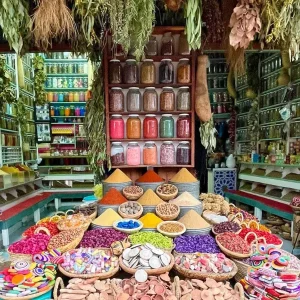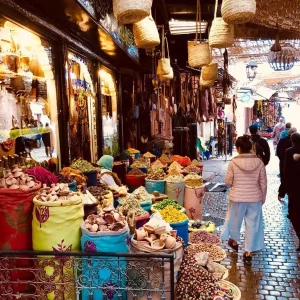Moroccan Spices: Uncover the Exquisite Flavors of North Africa
Uncover the Exquisite Flavors of North Africa
Introduction
Moroccan Spices, welcome to the fascinating world , where eminently delicious tastes and ages-old customs perfectly to produce a culinary tapestry that mesmerizes the senses. Culture is firmly interwoven in its history and character, from the vibrant spice markets of Marrakech to the peaceful vistas of the Sahara Desert.
A Flavorful Journey
Explore their distinctive qualities and role in Moroccan cuisine as we set off on a trip through the fascinating world of Moroccan spices.
1. Ras el Hanout: The King of Spices
Ras el Hanout, which translates to “top of the shop,” is the finest spice from Morocco. Numerous spices, like cinnamon, cumin, coriander, ginger, and others, are included in this wonderful combination. it gives Moroccan recipes a rich depth when it is adding to tagines, couscous, and grilled meats.
2. Harissa: The Fiery Red Blend
Harissa is a fiery chili paste that awakens the senses with its powerful flavor and bright red color. A hot sauce that gives foods a bite, is the fundamental ingredient in Moroccan cooking.
3. Cumin: Earthy and Warm
Cumin is widely used in Moroccan cuisine because of its warm and earthy undertones. Gives Moroccan specialties a distinctive perfume and improves the entire flavor, whether it is use in spice rubs, stews, or rice dishes.
4. Saffron: The Golden Elixir
Saffron is used sparingly in Moroccan cuisine and is prized for its wonderful flavor and golden hue. It adds a posh touch to whatever it touches. Saffron enhances the taste of everything it is add to, from savory tagines to sweet sweets like sfouf.
5. Paprika: A Dash of Color and Flavor
Moroccan foods benefit from the color and delicate sweetness of paprika, which is frequently produced from dried bell peppers. Paprika adds color and flavor to marinades and spice mixtures.
6. Ginger: Zesty and Invigorating
Ginger is a versatile spice in Moroccan cookery because of its zingy and energizing flavor. Moroccan cuisine benefits from ginger’s delicious flavor and health advantages whether it is used in savory recipes or traditional drinks.
7. Coriander: Fresh and Fragrant
Moroccan meals benefit from the reviving and aromatic addition of cilantro, which can be consumed as seeds or leaves. Its zesty nuances blend in well with other flavors and offer a lovely balance.
8. Cinnamon: Warmth and Sweetness
Cinnamon is a beloved spice in Moroccan pastries because of its warm and sweet flavor. A key ingredient in Moroccan sweets, appearing in everything from honey-drenched pastries to fragrant rice puddings.
9. Turmeric: A Natural Healer
Beyond its brilliant yellow hue, turmeric has several health advantages. In Moroccan cookery, it balances the entire taste profile by adding color and a tinge of bitterness.
10. Nutmeg: Nutty and Delicate
Moroccan pastries and spiced coffee benefit greatly from the nutty and delicate flavor of nutmeg. Its distinctive taste improves both savory and sweet foods.
The Ancient Moroccan Spice Customs
Spices in Moroccan are more than just taste enhancers; they also symbolize a long-standing cultural tradition. Let’s explore some venerable customs associated with these fragrant treasures.
11. The Art of Spice Blending
The technique of spice mixing is highly valued in Moroccan society. Blends like Ras el Hanout, each with its own particular combination of ingredients and proportions.
12. Spice Markets: A Sensory Extravaganza
A trip to a Moroccan spice bazaar is a once-in-a-lifetime adventure. A sensory experience is created by the brilliant colors, alluring fragrances, and lively environment. Travelers may explore the variety of spices on exhibit while being fully immersed in the local culture.
13. Spice Rituals: Enhancing Daily Life
Beyond merely cooking, Moroccan spices are incorporate into everyday life. Spices are a significant part of Moroccan culture, appearing in everything from traditional medicines to the use of certain spices in religious rituals.
14. The Culinary Magic of Tagines
Slow-cooking scrumptious foods with a flavorful mixture of spices is done in tagines, which are traditional clay pots from Morocco. Meals are soft and tasty because to the special qualities of the clay and the infused spices.
15. Spice Appreciation: A Family Affair
Moroccan families start their children off with a love of spices. Children see and take part in the production of spices, helping them to grasp their cultural significance.
Traditional Moroccan Dishes: A Symphony of Spices
16. Couscous: A Staple Dish
The classic Moroccan cuisine couscous is made of fluffy semolina grains that are perfectly boile and serve with a range of delectable meats, veggies, and, of course, a variety of Moroccan spices.
17. Lamb Tagine: A Flavorful Delight
With prunes, apricots, almonds, and a variety of spices, soft lamb is slowly cooking in a dish called lamb tagine that melts in your mouth. A delicious fusion of sweet and savory tastes is the ultimate product.
18. Pastilla: A Savory Sensation
A wonderful Moroccan dessert that perfectly combines textures and flavors is pastilla, a savory pie made with pigeon meat or chicken, nuts, and spices.
19. Moroccan Mint Tea: A Ritual of Hospitality
The well-known Moroccan mint tea is a concoction of green tea, fresh mint leaves, and sugar that is frequently served in elaborate teapots. Its flavorful perfume and reviving taste go well with warm and welcoming moments.
FAQs about Moroccan Spices
Q1: What are the must-have Moroccan spices for beginners?
- To add crucial flavors to their cuisine, Moroccan novices should start with Ras el Hanout, Cumin, Paprika, and Ginger.
Q2: How can I store Moroccan spices for maximum freshness?
- Moroccan spices should be kep in sealed containers away from heat, light, and moisture to maintain their freshness.
Q3: Are Moroccan spices suitable for vegetarians?
- Yes, Moroccan food offers a wide variety of flavorful vegetarian dishes that is packing with spices.
Q4: What makes Moroccan Spices unique compared to other spice blends?
- Moroccan spices are renowned for their complex blends and well-balanced tastes, providing a unique flavor that sets them apart.
Q5: Can I use Moroccan spices in international cuisines?
- Absolutely! Moroccan spices may enhance the flavor of many different types of international cuisine by adding new tastes.
Q6: Are Moroccan spices known for their health benefits?
- Numerous Moroccan spices, such as turmeric and ginger, are excellent complements to a balanced diet because of their many health advantages.
Conclusion
We hope you have been enchanted by the flavors, enthralled by the traditions, and motivated to embrace the enchantment of Moroccan cuisine as we say goodbye to our enthralling voyage through the world of Moroccan Spices. Moroccan spices give a sensory experience that crosses boundaries and enlivens the palette, from the vivid marketplaces to the hearty cuisine.
So why not start your culinary journey and allow the seductive aromas of spices transport you to the mythical continent of North Africa?
Uncover the Exquisite Flavors of North Africa


Moroccan Spices
Note : If you need a city Tour or a trip Let us know, The Tour Can be Customized Depending on your Needs ( Time , Dates , pick up and drop off locations…ect)
Whether you’re traveling as a couple, a small group of friends or family, whether you crave history, adventure, culinary delights or a peaceful getaway, we can help you create the dream holiday at your dream destination. Contact us
